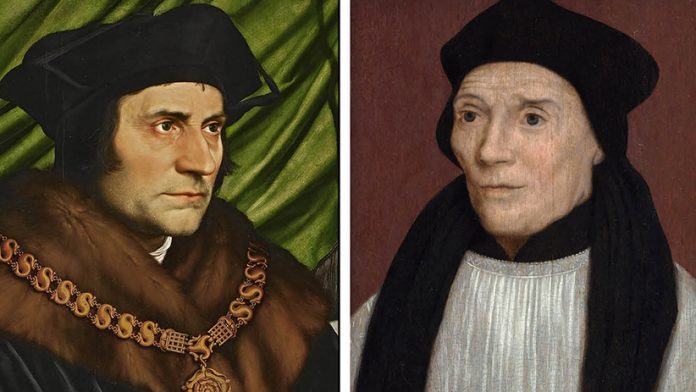
Today, on the first official day of summer, we celebrate two martyrs, John Cardinal Fisher and Thomas More, as well as a bishop, Paulinus of Nola, a poet, senator, and former married man, who, after his wife’s death, became a priest, and was elevated to oversee the diocese of Bordeaux in southern France in the fourth century.
More’s story is well known due to Robert Bolt’s 1960 play, A Man for All Seasons, and subsequent marvellous film adaptation (well, there were actually two, the first in 1966 with Paul Scofeld’s More being the definitive version).
More was Chancellor of England, while Fisher was bishop of Rochester, both high-ranking Englishmen who, in the gimlet eyes of Henry VIII, defied his authority and were guilty of treason. It was not about his attempted marriage to Anne Boleyn (I say attempted, since his legitimate wife, Catherine of Aragon, was still alive), but rather the fact that Henry, to an gain his coveted annulment, declared himself head of the Church of England, with his spiritual authority within his own lands superseding that of the Pope. Of course, neither More nor Fisher could countenance such a usurpation, and could not in good conscience sign the Oath of Supremacy. Every other bishop did so (but redeemed themselves under the reign of Henry’s daughter Elizabeth); most of the other ‘noble’ laymen also signed away the universal authority of the Church. First Things recently published a tendentious piece by the otherwise-insightful mind of Peter Hitchens, an avowed Anglican, who, in the midst of much muddling, but with his usual verve, tries to justify the execution of More and Fisher on political grounds. I am not sure Hitchens realizes to what lengths More went to avoid execution on ‘political grounds’, and only resigned himself to the chopping block when it was a choice between Christ and the king, between his soul and his body, his conscience or expediency.
They make very good patrons and examples in our day, as we will face similar choices: I have an article published this morning in Crisis on the Trinity Western debacle, with the Supreme Court denying them the right to grant law degrees due to their ‘covenant policy’, requiring students to keep sexual activity only within a lawful marriage. This was seen as discriminatory to homosexuals (as well as fornicators and adulterers, one might think, but they are not so vocal). TWU now has to decide whether to capitulate, or forego its law program.
What this means, ultimately, is that fully Christian schools are no longer permitted, and what is happening to TWU will, eventually, happen to all. They are first on the chopping block since an LL.B. is still a coveted degree, and hence the alleged ‘discrimination’ more tangible and visceral. We should continue the fight, but hope in the meantime that less worldly-and-coveted programs and degrees, from history to theology to literature, will remain, like the humble hobbits, hidden. For how long, no one knows, but trust in God, and do good while we can.
And the trade wars continue, with Trump standing firm on his tariffs. The exposed open market is not all that pleasant a place, but perhaps it is time to inject some reality into the economy, which has become so unhinged from what things are actually ‘worth’, from people’s work (how much should lawyers, politicians, police officers, physicians and vets get paid?), to goods and services (beer, haircuts, Macbooks and BMW’s). Value is a volatile thing, and we may soon see what people really hold dear.
Saints Thomas More, John Fisher and Paulinus of Nola, orate pro nobis!











